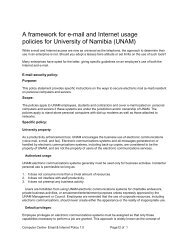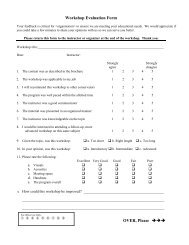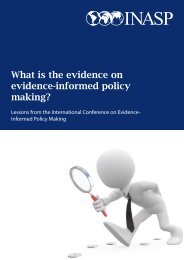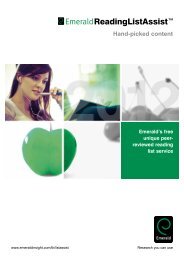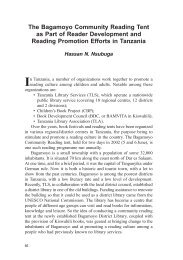INASP newsletter 49.pdf
INASP newsletter 49.pdf
INASP newsletter 49.pdf
You also want an ePaper? Increase the reach of your titles
YUMPU automatically turns print PDFs into web optimized ePapers that Google loves.
Futures (ACSF) as lead convenor, Policy Café is to be a seriesof round table discussions that will gather policymakers,researchers and other concerned individuals/organisationsthat are keen on working on evidence-based policy makingfor development. The series (three rounds of discussion)shall take on three critical policy issues regarding the themegovernance and development where both demand andsupply of research on such areas shall be given a venue tocrystallize consequently into a key local policy.The training was anchored on the notion thatindividuals have different learning preferencesdepending on the activity undertaken... there isno ‘one-size-fits-all’ format for any training.Sharing this as well with my Political Science class on LocalGovernment and Administration, my students have gonethrough the exercise of generating evidence first when theyformulated policy papers on local governance issues as acourse requirement. In my consulting work at the moment oncoordinating road investments, we also use evidence-basedprogramming employing value chain analysis and otherpertinent economic data matched with updated povertydata along with a healthy set of criteria for prioritizationof roads (Connectivity and network effect, Potential socioeconomicimpact, Average daily traffic and Road importance,Road condition, Length of road) in lobbying for funding forroads development. Daunting as it may seem, I endeavor toinclude the principles from EIPM in whichever work I am in.Prof. Regina Estorba MacalandagExecutive Director, Asia Center for Sustainable FuturesProfessor of Political Science, Holy Name UniversityTagbilaran City, Bohol, Philippinesregina_estorba@yahoo.comPractising DevelopmentPractising Development is a blog managed by <strong>INASP</strong>.This site aims to explore ideas, discuss issues and sharelearning around research, information and development.While managed by <strong>INASP</strong>, the views and opinionsexpressed on Practising Development are those of theindividual authors and do not represent those of theorganisation.http://blog.inasp.infoWe encourage comments and discussion, but if you wouldlike to contribute a blog post, please contact Liam Finnis(lfinnis@inasp.info)More opportunity than assignmentNg’ang’a Kibandi reflects on his experienceas an <strong>INASP</strong> internNg’ang’a KibandiThe opportunity to intern with <strong>INASP</strong> came at a time whenI was longing for a new challenge. As a novice researcherand post-graduate student it is a rare occurrence to getan opportunity to explore your potential. The freedomof choice and involvement on the deliberation of matterspertaining to the internship I found intriguing.This participative warmth was taken even further whenI was awarded the freedom to choose what I desired towork on. I initially struggled with this as I felt like I had beendropped right in to the middle of the ocean and given thefreedom to swim in any direction. However, the supportand reassurance I was accorded right through made theexperience even more exciting.This internship has been an excellent resource of learningand growth for me especially on matters of research. I havealso come to appreciate the objectivity that is maintainedby the <strong>INASP</strong> team and hope to uphold it in futureendeavours. I have learnt to reach out and seek help aswell as appreciate challenges. Despite being a long distanceinternship I have never felt alone and that stood out for me.The project was enlightening and gave me a whole newoutlook on an area I found to be very unfamiliar. I amconvinced that research on this area will make a significantcontribution especially in developing nations where policymaking is concerned.In addition to the research and experience itself, theproject allowed me to present at a conference. This wasan opportunity that I didn’t expect. In fact, many of theprivileges I enjoyed as an intern with <strong>INASP</strong> I had notanticipated.Initially, I expected this internship to be solitary and focused.I thought I would be given an assignment, a deadline, anda contact person with whom to report to. My experiencehas been different as I was given the chance to choose andmanage an assignment myself. Additionally, my contactAlex has acted more as a mentor than a ‘boss’.My experience as an intern with <strong>INASP</strong> has surpassed myexpectations and the learning experience, more so theexposure to a different way of working within a team hasbeen a true joy.Ng’ang’a Kibandinkibandi@gmail.comwww.authoraid.info<strong>INASP</strong> Newsletter 49 December 20127




